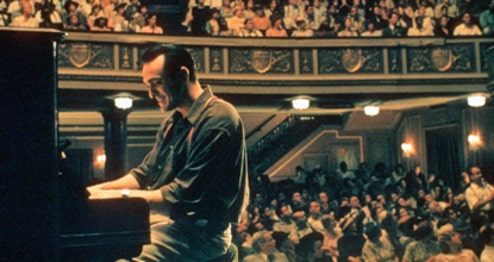Eye For Film >> Movies >> The Cradle Will Rock (1999) Film Review
The Cradle Will Rock
Reviewed by: Angus Wolfe Murray

An ensemble political picture, involving artists, industrialists, Orson Welles, an impoverished songwriter, Mussolini's mistress (Susan Sarandon), a washed out vaudevillian and Nelson Rockefeller (John Cusack) has every chance of hitting the wrong note and doing a Bonfire Of The Vanities. Tim Robbins, who directed and wrote the script, recreates the mood of the Great Depression in New York with humour and optimism.
By touching upon the lives of a number of actively involved individuals, he avoids the negative in favour of passion and endeavour, whether it be Diego Rivera's (Ruben Blades) monumental mural at the brand new Rockefeller Centre, or Welles' (Angus Macfadyen) refusal to have his show cancelled because of Red-bashing hysteria.

The performances reflect Robbins' upbeat approach and are as enjoyable as they are inspired. It has been a long time since Bill Murray stretched beyond his trademark deadpan delivery and yet here, playing a dejected ventriloquist, who argues with his dummy, he discovers a depth of pathos that reveals genuine human qualities.
Vanessa Redgrave leaps like a thoroughbred into the role of Countess La Grange, eccentric wife of a steel magnate (Philip Baker Hall), threatened by a gruelling, expensive strike. She embraces the arts with the enthusiasm of a debutant and flirts with the romance of saving Orson's embattled company, as powerful figures on the right make moves to wind up the successful Federal Theatre Project, a government subsidised nationwide scheme.
Hallie Flanagan is head of the Works Progress Administration that looks after the FTP, a woman of exceptional energy and purpose, who goes to Washington to argue the cause of theatre-for-all in front of a biased committee of Republican senators, and Cherry Jones plays her as if touched by God.
Marc Blitzstein's (Hank Azaria) musical is The Cradle Will Rock, taken up by Welles and rehearsed by a classically trained unit of the FTP, which includes an unknown ingenue (bright eyed Emily Watson), before being officially silenced on the opening night, until the Countess and producer John Houseman (Cary Elwes) think of a way round the ban, enabling Robbins to stage a heart-stopping finale.
"We control the future of art because we pay for the art," William Randolph Hearst (John Carpenter) boasts. The film proves him wrong. The creative spirit cannot be shackled. It carries the germ of freedom.
Reviewed on: 19 Jan 2001
















